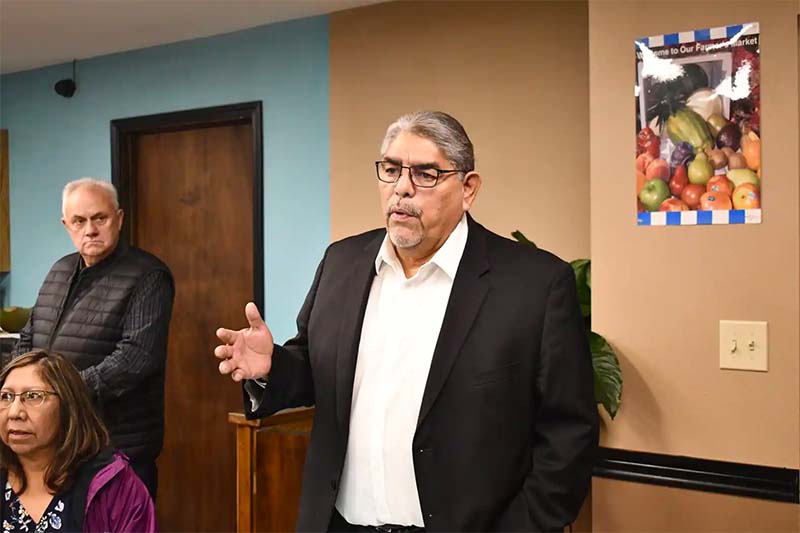
- Details
- By Lenzy Krehbiel Burton
ANADARKO, Okla. — A judge with the Court of Indian Offenses for the Southern Plains has issued a preliminary injunction, thus temporarily blocking the Kiowa Tribe of Oklahoma from spending any more of its CARES Act funds.
Chief Magistrate Shannon Edwards sided with the seven members of the Kiowa Tribe’s legislature and ruled that Chairman Matthew Komalty cannot spend any more CARES Act money until a budget is approved by the Kiowa Indian Council, which is open to all adult tribal citizens.
Adopted in 2017, the tribe’s constitution includes provisions that all funding sources are part of the tribe’s budget and that the budget must be approved by Kiowa voters, along with any modifications to it.
“The constitution is very clear that both the legislature and the KIC have a role to play in establishing the annual budget of the tribe and any modifications thereto,” Edwards wrote. “Such is the case even if the KIC is only afforded an ‘up or down’ vote of a budget proposal submitted by the chairman or legislature.”
Two different dates are listed on the order. A received stamp from the court clerk’s office is dated Tuesday, while the closing line of the opinion has Monday’s date.
The Kiowa Election Board has already posted notice of a budget election for Aug. 22. The polls will be open from 9 a.m. to 4 p.m. with precincts in Anadarko, Carnegie, Elgin, Hobart, Lawton and Norman. Absentee ballots will be mailed by Friday.
The tribe received about $19.5 million in federal COVID-19 relief funds, which the executive branch categorized as grant money. After two meetings with the legislative branch, the executive branch formally unveiled a plan for that money that required Kiowa citizens to complete a four-page needs assessment before receiving funds to cover coronavirus-related expenses.
Along with requesting information about the size of an applicant’s household, its income and expenses both before and during the pandemic, the application requires documentation to support the specific request, such as a shutoff notice for utility aid, verification of unemployment benefits for food assistance or a school supply list for help with distance learning costs.
However, several members of the Kiowa Tribe’s legislature have publicly said they have other ideas on how the money should be spent, including a $1,000 payment to all of the roughly 14,000 enrolled Kiowa citizens.
Under guidance issued by the U.S. Department of the Treasury, state, local and tribal governments are allowed to use CARES Act money to provide direct cash assistance to their constituents. However, those funds must be disbursed based on documented COVID-19-created needs that fall within specific guidelines. Blanket per capita checks are not allowed and going that route can be grounds for the federal government to request an audit.
A spokeswoman for the Kiowa Tribe confirmed Tuesday afternoon that a previously announced event for northeastern Oklahoma elders to get help with their assistance forms was still on as scheduled for Tuesday and Wednesday evenings.
However, several elders who arrived at the event’s posted address in midtown Tulsa on Tuesday at the scheduled time were greeted by a locked door covered with plywood and no tribal employees or officials in sight.
“Got a call from my sister about some injunction,” said an elder who declined to give his name. “Guess I shouldn’t be surprised that no one’s here.”
Chairman Komalty did not respond by deadline to inquiries from Native News Online about the status of pending aid applications or the court’s order. A Tuesday night post to the tribe’s official Facebook page indicated that the executive branch will be appealing the injunction.
In addition to the injunction, an impeachment hearing is scheduled for 10 a.m. Thursday after being postponed one week due to a potential COVID-19 exposure.
The legislature unanimously approved five counts against Komalty in June, including failing to secure an independent auditor to annually review the tribe’s budget and spending CARES Act funds without approval from the KIC or legislature.
In order for Komalty to be removed, the legislature must have a unanimous vote for impeachment on a single count. If adopted, impeachment is effective immediately.
A separate recall petition is also circulating among the tribe’s electorate, which requires 1,500 signatures to call a special meeting of the Kiowa Indian Council to vote on removing Komalty from office. As per the tribe’s constitution, the number of signatures needed is based on the number of votes cast in the Kiowa Tribe’s last election in 2017.
More Stories Like This
Native News Weekly (August 25, 2024): D.C. BriefsNavajo Nation Mourns the Passing of Former Vice President Rex Lee Jim
Deb Haaland Earns Endorsement From Communications Workers of America Local 7076
University Soccer Standout Leads by Example
Two Native Americans Named to Democratic Congressional Campaign Committee's“Red to Blue” Program
Help us defend tribal sovereignty.
At Native News Online, our mission is rooted in telling the stories that strengthen sovereignty and uplift Indigenous voices — not just at year’s end, but every single day.
Because of your generosity last year, we were able to keep our reporters on the ground in tribal communities, at national gatherings and in the halls of Congress — covering the issues that matter most to Indian Country: sovereignty, culture, education, health and economic opportunity.
That support sustained us through a tough year in 2025. Now, as we look to the year ahead, we need your help right now to ensure warrior journalism remains strong — reporting that defends tribal sovereignty, amplifies Native truth, and holds power accountable.
 The stakes couldn't be higher. Your support keeps Native voices heard, Native stories told and Native sovereignty defended.
The stakes couldn't be higher. Your support keeps Native voices heard, Native stories told and Native sovereignty defended.
Stand with Warrior Journalism today.
Levi Rickert (Potawatomi), Editor & Publisher
